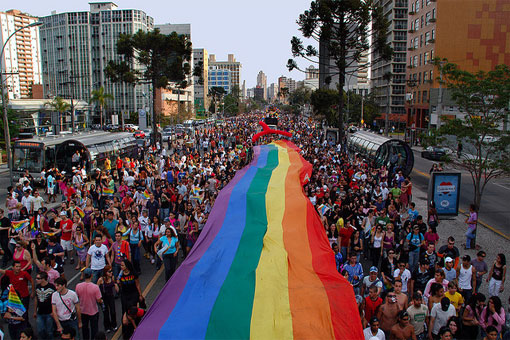In a historic and unanimous ruling, the Brazilian Supreme Federal Tribunal declared on May 5 that people in “stable, enduring and public” same-sex relations must be granted the same rights as people in straight marriages. The ruling does not exactly establish gay marriage in Brazil as it is in Canada, Argentina and Mexico City, but it essentially erases the inequality in legal rights between married couples and civil unions.
All for one and one for all
In making this decision, the Brazilian Supreme Federal Tribunal advanced a landmark argument that could have ripple effects across Latin America and beyond. What the court did was to find a solution to the problem of heteronormative language in legal documents. In the case of Brazil, article 226 of the constitution and article 1723 of the civil code discuss marriage rights as available to “a man and a woman.” Opponents of gay rights in Brazil used this blatantly heteronormative language to contend that granting marriage rights to same-sex couples would be unconstitutional. This is the argument that the court dismissed.
The court argued that despite the fact that Brazil’s fundamental legal documents discuss marriage in heteronormative terms, nothing suggests that those same rights “can be denied” to others. A democratic constitution based on non-discrimination, one judge argued, is useless if it is unable to ensure that the rights granted to some groups are also granted to everyone else.
Thus, if male João enjoys constitutional rights based on his marriage to female Gisele in Brazil, then it is incumbent upon the court to require the state to also grant female Vitória the same rights if she enters a comparable union with Gisele. Not to do so would be to discriminate against sex, which is banned in the constitution. According to some estimates, with this ruling, Vitória and Gisele would receive 112 rights—the same number of rights they each would gain if they were to enter a straight marriage instead.
The court is therefore not only upholding the venerable principle of minority rights, but more important, offering a solution to civil codes worldwide that contain heteronormative definitions of marriage. In a democracy, even when such language exists, this ruling clearly states that it is unconstitutional to interpret the text in exclusive terms.
This ruling might not be applicable to non-democracies or countries that explicitly outlaw homosexual unions. But in Latin America, where legal documents contain heteronormative language without explicitly outlawing homosexual partnerships, the Brazilian case could open opportunities to extend marriage rights for homo-affectionate (“homoafetiva”) partnerships, as the Brazilian court calls gay couples.
Weber meets Montesquieu
It is also important to reflect on how this historic decision came about, because it illustrates both the opportunities and the challenges that exist for advancing LGBT (lesbian, gay, bisexual, and transgender) rights in general. The regrettable reality is that, as proven by the United States, LGBT rights are not easy to advance by popular vote.
The reason is simple, and sad. In most countries, majorities are likely to oppose granting LGBT rights, and thus, advocates make a deliberate effort to avoid the referendum route. Consequently, in Brazil, the advancement of LGBT rights needed to occur through an alternative route—a court ruling. In that sense, the Brazil case is both a step forward, insofar as gay rights were expanded, but also an implicit recognition of a major obstacle—pervasive homophobia among voters.
In fact, homophobia lingers not just among voters, but also, and more alarmingly, throughout the Brazilian political class. The reason the Brazilian court had to act was because the Congress was refusing to act. A same-sex civil union bill sat in Congress since 1995. This suggests that homophobia is so rampant that it simply became impossible for a majority coalition of legislators to feel that it was electorally safe to advance gay rights.
Brazil is therefore closer to the Massachusetts case, in which a supreme court took action to force a reluctant legislature to act, than to Argentina, where gay marriage emerged as a result of legislative acts. Why legislators in Brazil were more constrained or more risk averse than their counterparts in Argentina is a terrific social science question for future research.
But still, the Brazilian case demonstrates that when prospects for gay rights seem tough—that is, when homophobia is widespread, when legislators are reluctant and when churches launch major homophobic campaigns—there is still hope: the court system. Montesquieu’s eighteenth-century insight that a true democracy requires three separate powers—the executive, the legislature and the courts—in case one branch falters, has proven to be all the more prescient in the twenty-first-century struggle for LGBT rights.
And yet, it is a mistake to conclude from the Brazilian case that all one needs is a strong and autonomous judiciary. In Brazil, the state was an additional and necessary factor. Unlike the United States and even Argentina, the state in Brazil emerged as the most forceful producer and claimant of LGBT rights. It was none other than the attorney general’s office at the federal level along with the government of the state of Rio de Janeiro that presented the case before the court. This is noteworthy. The reason state actors in Brazil reached out to the courts is that they were already issuing important rights to same-sex couples—such as pension privileges and health insurance benefit—and they wanted the court to lock in those practices.
This makes the Brazilian case all the more innovative. Beyond being an example of court-based advancement of rights, it is a case of a state-led push for such rights. It is the modern incarnation of Max Weber’s famous early twentieth-century argument that modern bureaucracies, after a history of coercion and concessions to market actors, would somehow transition into rights-granting entities for all.
Weber might not have been thinking of LBGT rights. But there is no question that a sort of Weber-meets-Montesquieu phenomenon is a crucial part of the explanation for this historic ruling. Scholars like Juan Marsiaj at the University of Toronto have shown that civil society pressure by LBGT groups was crucial in forcing the state to turn more pro-gay. But still, another question that should be addressed is why comparable pressures in other countries do not achieve the same effects on the state.
The 2010 census in Brazil shows that approximately 60,000 couples (less than 0.2 percent of total unions) are same-sex partnerships. Naturally, more will need to be done to ensure protections for all the many millions of LGBT people who find themselves outside “stable, durable and public” unions. But for now, at least 60,000 couples in Brazil have new legal equality.
Yet, it would be a mistake to see this court ruling as a mere victory for a tiny cohort (partnered couples) within a tiny minority (LGBT citizens). Make no mistake about it. The Brazilian court’s ruling is important because it declares the principle that rights granted to one citizen cannot be denied to any other. Rather than a special concession to a tiny group, this is a major extension of a remarkable legal collective good. All Brazilians should rejoice.






